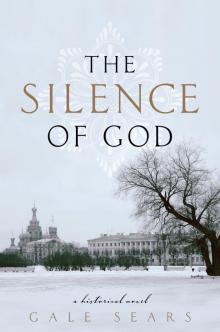- Home
- Gale Sears
The Silence of God Page 5
The Silence of God Read online
Page 5
“You can still buy flowers!” Agnes said brightly.
“Only if you have the money,” Natasha corrected. “White lilacs in winter—it’s disgraceful. The Duma should put a stop to it, but they are just silly puppets of the tsar.”
“Well, the country gardeners can’t stop growing things,” Agnes protested. “They have to maintain their greenhouses, you know, and they have to eat just like everyone else.”
“Let them grow potatoes and cabbages.” Natasha saw Agnes bite her bottom lip and knew her friend was about to get emotional. “Little squirrel, I’m sorry. I know you don’t like to talk politics.”
“I don’t like many things,” Agnes said, stamping her foot. “I don’t like how the other young women tease me just because I won’t cut my hair short. How dare they criticize me? Most of them don’t even wear corsets anymore.” Natasha covered a grin as Agnes continued. “I don’t like how I’m almost twenty-three and not yet married. I don’t like how everything is dreary and sad. St. Petersburg used to be a sparkling city, and now . . .” Tears wrapped themselves around her words. “Now we’ve had to change the name of our beautiful city to Petrograd because of the stupid war, because St. Petersburg sounded too German.”
“Agnes, calm yourself.”
Agnes stopped walking. “No! You think I’m foolish and care only about foolish things, but there are many serious things I think about . . . things that make me sad and angry.” She smacked her hand on a store window, frightening the merchant inside. “Do you think I like my brothers being away in the war? Do you think that it’s easy for my family to worry every day if Arel and Bruno are still alive?”
“Of course not.”
Tears rolled down Agnes’s cheeks and she dashed them away as soon as they appeared. “I don’t like how there’s little food to feed us and little fuel to warm us—but what can I do?”
Natasha handed her a handkerchief. “Here, blow your nose.”
“My father tries to help. He buys extra bread for the neighbors when he can, but we have less money now too, you know. Not many people buy silver goblets or gold chains these days.”
The wizened shopkeeper opened his door. “Hey! Get away from my shop!”
Agnes moved quickly down the street, talking to herself until Natasha caught up. “We are not wealthy merchants anymore, Natasha Ivanovna, but we are certainly not Bolsheviks. We want change, but we don’t wish to harm the tsar.”
“My friend, stop!” Natasha said firmly. She lowered her voice. “You never know who may be listening.”
Indeed, several people glowered at them as they passed.
“And that’s another thing I don’t like,” Agnes said. “I don’t like how everyone looks cross or suspicious. People used to smile more.”
Natasha tempered her response. “Perhaps there’s not much to smile about.”
Agnes nodded. “Perhaps not.” She took a deep breath and wiped away the last of the tears. “I’m sorry. It’s just that we’ve not heard anything from Arel or Bruno from the war—not for a long time. And Mother has been snapping at everyone. My nerves are worn-out. That’s why I thought this walk might do me good, might help me forget about my troubles for awhile.”
“Of course.”
Agnes took Natasha’s arm and they walked along in silence.
Natasha pondered the unique bond they shared—a bond that tied them together even though their lives were so different. Their families’ apartments stood side by side on the lovely Griboyedov canal promenade, looking across the water to the St. Nicholas Cathedral. Natasha smiled to think that while her family occupied only two of the four stories in their building, Agnes’s family took up all the levels in theirs. Johan Lindlof’s gold and silver shop was on the ground floor with the kitchen at the back, and the other three floors were living space for the large family.
When visiting the Lindlof home, Natasha had often been overwhelmed by Agnes’s five brothers and two sisters. They made so much noise. Natasha was an only child of a mother who had grown up in the country and a father who was a professor of language and literature at the university. Agnes’s father, on the other hand, was an established artisan and merchant selling jewelry to the wealthy bourgeoisie. He also supplied ornate and costly trappings for the homes of the St. Petersburg elite.
Natasha shook her head. Foolish frills. She glanced over at her friend and saw the frayed cuffs and patched pockets on her once fancy coat, evidence that even the upper-class merchants were beginning to feel the economic demise of a flawed system. Good, Natasha thought. She bit her bottom lip and chided herself for such unsympathetic feelings.
She did not wish her friend ill, but life in Russia was changing, and if anything tested their friendship it was their opposing views on politics and religion. Agnes had been raised in an obscure American religion called Mormonism and taught to honor the tsar and the government he dictated. Natasha was raised according to her father’s wishes, and was therefore separated from any form of faith, and encouraged to question every injustice and edict.
Natasha pulled her mind away from weightier issues and thought instead of their physical differences. Agnes was average height and curvaceous. She had golden brown hair that reached halfway down her back; she normally wore it pinned up with soft curls around her face. Her eyes were pale blue, and people often commented on her open and innocent expression. Natasha had always been taller than her friend, and now, at almost twenty-four, her physique was slender and boyish. She had brown eyes and chocolate brown hair, and, like other emancipated young women of her day, her hair was cut short. She liked it—it suited her heart-shaped face. She recalled Agnes’s shocked reaction when she’d first seen her after the shearing.
“Natasha, what did you do? It’s frightful! If your hair was yellow, you’d look just like one of those boys in Holland.”
So many differences.
“Are you angry with me?” Agnes asked, bringing Natasha’s thoughts back to the present.
Natasha looked at her and shook her head. “No, of course not. I was just thinking how different we are, and how long we’ve been friends.”
“We’ve been friends all our lives,” Agnes answered, patting Natasha’s arm. “We played together as babies.”
“I don’t remember,” Natasha said flatly.
Agnes laughed. “Well, of course you don’t. We were babies.”
“I do remember your brothers being dreadful to me, though.”
Agnes laughed again. “They weren’t being dreadful. They were just being boys, and you weren’t used to it.” Her voice became conspiratorial. “Remember when we figured out that several of them liked you?”
Natasha grinned. “Yes.”
“And you gave Oskar a black eye to set things straight.”
“They were afraid of me after that.”
“And now you have the handsome and intelligent Sergey Antonovich Vershinin to occupy your thoughts and ruin our friendship.”
“Don’t be silly.” Natasha prickled. “Sergey Antonovich and I are associates at the university.”
“No, no, no, Natasha Ivanovna. I know you, and you are very attracted to this man,” Agnes stated emphatically.
“You’ve only seen us together a few times.”
“And that has been enough to know.”
They crossed a bridge over the Griboyedov canal and a cold wind sent needles of pain into the exposed skin on their faces. Both young women groaned and pulled their scarves higher over their cheeks.
“Good thing we’re almost home,” Agnes mumbled through the cloth. “Should we continue our game?”
“Why not?” Natasha answered. “I hope our brains aren’t frozen.”
“It’s your turn to think of a riddle for me,” Agnes said.
Natasha smiled. How long had they been playing these riddle
games? She remembered sitting in Agnes’s bedroom when they were nine or ten and trying to outsmart each other with hidden names or locations.
“Don’t make it too hard,” Agnes added. “I think my brain is frozen.”
“This should be easy,” Natasha assured. “Are you ready?”
Agnes nodded.
“The palace we eat.”
“What?” Agnes asked loudly. “The palace we eat? Is that what you said?”
“Yes. The palace we eat.”
“The Stroganoff palace,” came a deep voice behind them.
The two women jumped and Sergey Antonovich laughed.
“Sergey Antonovich!” Natasha scolded. “Have you been following us?”
“I have—since the bridge.”
Natasha could tell that Agnes was captivated by the striking young man with his shoulder-length dark hair and smartly styled beard and mustache. Like Natasha, Sergey had brown eyes and a tall lean body. She could just imagine Agnes knitting them together as the perfect couple, and she knew her friend well enough to know that she would willingly sacrifice their friendship if a higher order of love came along.
“Good morning, Miss Lindlof,” Sergey said, nodding his head in her direction.
“Good morning,” Agnes returned shyly.
“What are you doing here?” Natasha asked, noting the suppressed excitement infusing Sergey’s smile. “And so early?”
“You haven’t heard?”
“Heard what?” Natasha asked, a hint of irritation in her voice. “We have been out walking.”
“Tsar Nicholas has abdicated his throne.”
“What?” the women chorused.
“As of early this morning he gave up his throne. We no longer have a tsar. Well, he turned things over to his incompetent brother, Mikhail, but that won’t last long.”
Natasha was first to recover from the shock. “This is not just a rumor?”
Sergey shook his head. “No. It’s been officially announced. Nicholas came back from the war where Russian soldiers are deserting by the hundreds to find chaos at home: strikes by factory workers, women marching against him, and mutinies by his Imperial guards!” Sergey picked up Natasha and spun her around. “He had no choice! He’s finished!” They laughed together. “They are putting him and his family under house arrest at Tsarskoe Selo.”
“He should have listened to his people and not his German wife,” Natasha said.
“And someone should have killed Rasputin sooner than they did,” Sergey added. “But it’s done now! It’s done now, comrades! Three hundred years of Romanov rule is ended!”
Natasha’s heart was beating fast. “And now perhaps the people will be heard.”
“Yes! Yes, of course. A new government will now be free to further the Socialist ideals.” Sergey’s voice filled with passion. “And soon Lenin will return from exile in Switzerland!”
Natasha turned excitedly to Agnes. “Agnes! Can you believe this?”
The grief on Agnes’s face stunned Natasha into silence.
Agnes backed away from her friend, and when Natasha reached out a hand to her, she ran.
“Agnes, come back!”
“Let her go,” Sergey said, and Natasha noted the derision in his voice. “I think your friend is a White Russian.”
“Don’t!” Natasha commanded. “You know nothing about her.”
“Well, I believe she is crying for the fallen royal family.”
“Yes, I’m sure she is. Many Russians will cry when they hear of it.” She turned and moved quickly down the street.
“Where are you going?”
“To be with my friend.”
Notes
1. Russian Social Democratic Labour Party: Marxist Socialists. In 1903 the party split on the question of tactics into the Bolshevik and the Menshevik parties (roughly translated, “Bolshevik” means “majority” and “Menshevik” means “minority”). The Menshevik party included all shades of socialists who believed society must progress by natural evolution toward socialism. This was the party of the socialist intellectuals. The Bolsheviks believed in rapid change through upheaval and insurrection. In 1918 the Bolsheviks became the Communist Party, to emphasize their complete separation from the tradition of “moderate” or “parliamentary” socialism. The Bolshevik party proposed immediate working-class insurrection, seizing the reins of government in order to hasten the coming of socialism by forcibly taking over industry, land, natural resources, and financial institutions.
2. Bourgeoisie (adjective: bourgeois): The term “bourgeoisie” in sociology and political science historically denoted the middle or merchant class where social and economic power came from gained employment, education, and wealth, as opposed to the aristocracy, whose power derived from inherited wealth, and the proletariat, or the working class. Marxism defines the bourgeoisie as the social class that owns the means of production in a capitalist society. In modern society, after the collapse of the aristocratic class, the bourgeoisie became the ruling class. Often used as a term of disparagement.
3. The Great War (or World War I) embroiled most European countries, occupying four bitter years of fighting from August 1914 to November 1918. We are probably most familiar with the battles on the Western Front which involved Germany, Austria-Hungary, France, England, America, and several other countries. Russia fought on the Eastern Front against Germany, and lost some 1.6 million Russian soldiers during the conflict. Ironically, the seeds of the Russian revolution were sown during the Great War as Russia struggled to free itself of the worldwide conflict.
4. The city name of St. Petersburg changed several times between 1914 and 1991—from St. Petersburg to Petrograd during the Great War because St. Petersburg sounded too German; to Leningrad to honor the Bolshevik leader after his death in 1924; and back to St. Petersburg in 1991 after the fall of the Soviet empire.
5. Duma: The debacle of Bloody Sunday in 1905 weakened the power and stature of Tsar Nicholas II. To forestall rebellion, the Tsar established a duma, or legislative assembly, to help govern, but their actual power was limited. Over the next twelve years, economic conditions worsened, acute food shortages increased, and Russia became embroiled in the Great War. February 1917 saw strikes, rioting, military insubordination, and mutiny. Tsar Nicholas II attempted to put down the workers by force and dissolve the Duma. The Duma refused to obey, and Petrograd insurgents took over the capital. Nicholas was forced to abdicate and a Provisional Government was put into place. The leaders of this government were Constitutional Democrats (Cadets—see the notes to chapter nine).
6. Gregori Efimovich Rasputin: (January 2, 1869–December 29, 1916) A self-proclaimed holy man and wandering mystic, Rasputin was brought into the life of Russia’s royal family by Tsarina Alexandra, when it seemed he could miraculously ease the suffering of her son, Tsarevitch Alexis, who suffered painful episodes attendant with his hemophilia. Rasputin was murdered by a group of nobles who considered him a charlatan, a meddler in government affairs, and a depraved braggart.
7. White Russian: A designation for anyone with anti-Bolshevik sentiments or opinions.
Chapter Four
Petrograd
April 16, 1917
“Here you have Lenin who eats, sleeps, breathes, and dreams the revolution, and Tsar Nicholas who wanted nothing more than to take care of his family.”
“And his people. Didn’t the tsar wish to take care of his people?”
Sergey Antonovich turned a spurious look at his bear-like friend. “Nicholai Lvovitch, you know the answer to that. Nicholas never wanted to be tsar. He wanted to putter around in his garden, sail about on the Standart, and play games with his children. He would have given the honor of being tsar to his mother if the government had allowed it.”
Nicholai grunted. “When he ran from all h
is troubles he gave it over to his brother Mikhail to be tsar.”
“Who held the empire for two days,” Sergey scoffed. He downed his glass of vodka and poured another. “The tsar was always far from the people, up there on his golden pedestal. He never saw us or cared about our suffering.”
“Well, now we have Kerensky and the Provisional Government to take care of us,” Nicholai Lvovitch slurred.
“Kerensky is a fool. A Socialist who dances with the wealthy merchants. He is not a true Socialist.”
Nicholai reached out a beefy hand for the bottle of vodka, and Sergey snatched it away.
“Hey!” the big man protested.
Sergey wagged a finger at him. “You’ve had enough, my friend.”
“And what of you?” Nicholai growled. “You’ve been drinking as much as I have.”
“True, and we must stop now.” Sergey stood, the vodka bottle in his hands. “We have our meeting soon and our heads must be clear.”
Nicholai grunted. “My head is never clear anyway, so let me have that bottle!” He lunged for it and Sergey sidestepped.
Sergey’s voice took on a hard tone. “Leave it, Nicholai Lvovitch! You’re done.” He shoved the bottle into the cupboard and slammed the door.
Nicholai stared at him a moment, then swallowed hard, and sat down in his chair. “Sorry, comrade, you’re right. I would spoil the meeting if I passed out from too much vodka.” He slapped his hand on the table. “I did want to make one more toast to the grand duchesses though.”
“Make it with your empty glass,” Sergey answered.
Nicholai laughed and held up the smudged glass. “To Olga, Tatyana, Marie, and Anastasia! May they all marry peasants and live in izbas and hoe their own potatoes!”
“Well said!” Sergey concurred. “But no toast for their little brother, Alexis?”
“Of course, of course!” Nicholai barked. “We certainly can’t leave out the former tsarevitch. You, Sergey! You give the toast.”
Sergey gave a mock salute and raised his glass. “To Alexis, the once proud son of Tsar Nicholas and Tsarina Alexandra—may Rasputin’s ghost come to haunt him. May his attendant, Boatman Derevenko, fall off the Standart in perilous seas. May the innocent tsarevitch never be able to grow a beard, and may he marry a butcher’s daughter, become a butcher, and work with knives all his life.” Sergey gave another mock salute and thumped Nicholai on the back. “Breathe, my large friend, breathe.”

 The Silence of God
The Silence of God Letters in the Jade Dragon Box
Letters in the Jade Dragon Box One Candle
One Candle